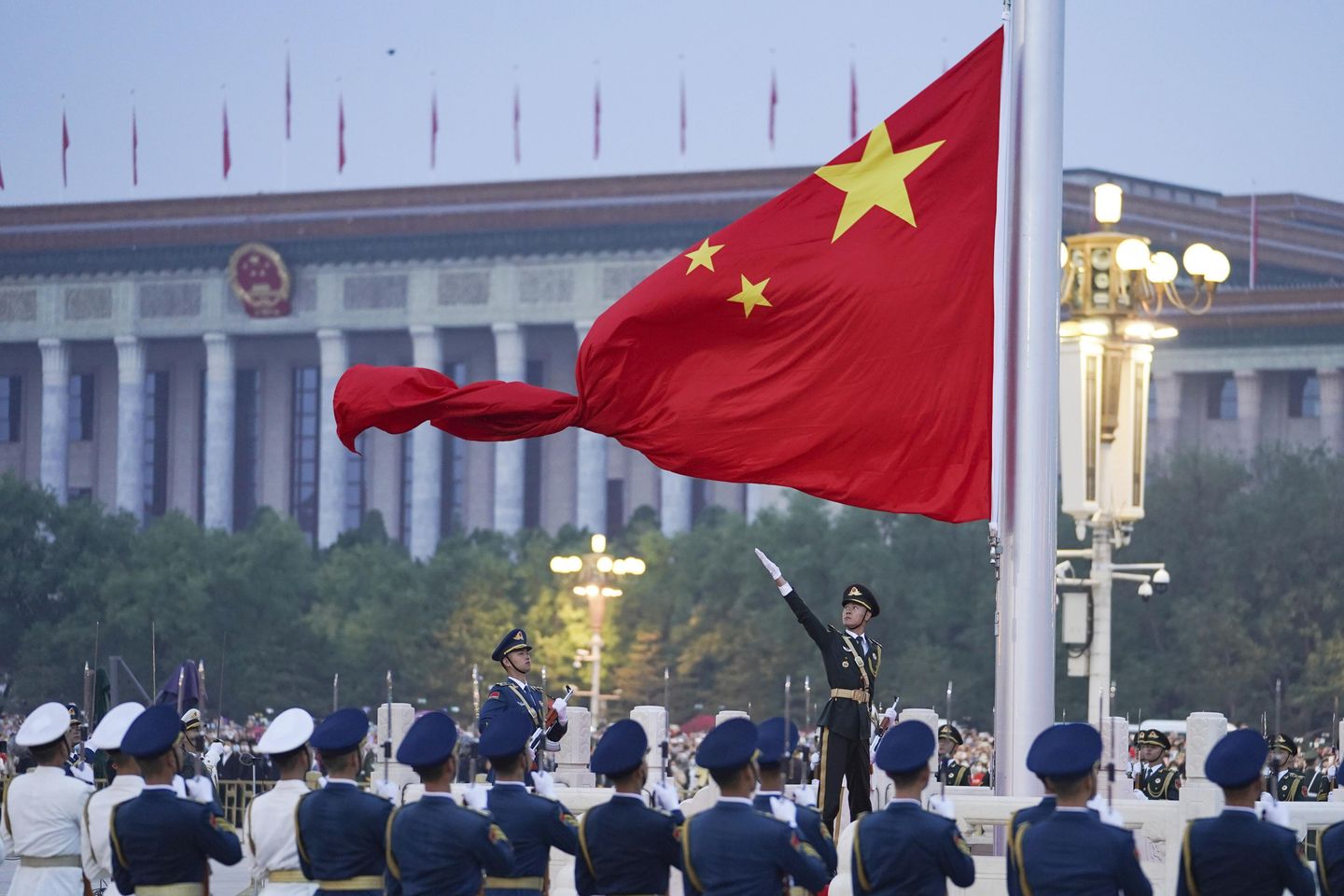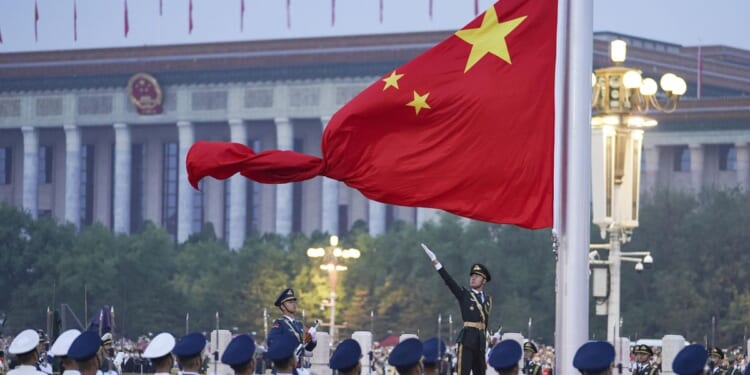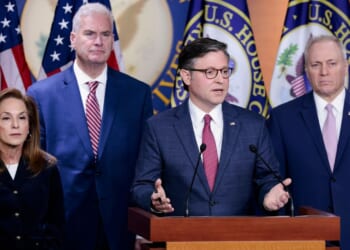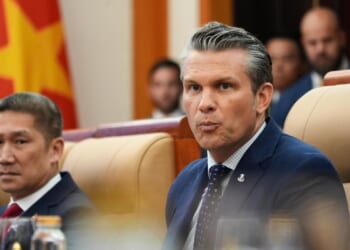
NEWS AND ANALYSIS:
Washington Times columnist Miles Yu, one of the nation’s leading China experts, incurred the wrath of the Chinese Communist Party recently, highlighting the global reach of his reports.
Mr. Yu appears to have hit a political nerve with his recent opinion article listing 10 reasons why Beijing’s call for reunification with Taiwan is “a hoax.”
His list includes the fact that Taiwan was never part of Communist China and that Taiwan’s current sovereignty is not an extension of the 1949 civil war between communists and nationalists.
“China’s ‘reunification’ slogan,” Mr. Yu wrote Oct. 27, “is a hoax sustained by fear, ideology and deception.”
Beijing’s ire was expressed in an unusually long and detailed rejoinder article that appeared Nov. 20 in the People’s Daily, the official newspaper of the Chinese Communist Party.
Mr. Yu was accused by the publication of “viciously attacking the mainland’s strategy and policies towards Taiwan.”
By sharing much of Mr. Yu’s original column in its detailed rebuttal, the People’s Daily actually offered its reported 944 million readers a rare honest assessment of the Taiwan issue, Mr. Yu said.
The People’s Daily piece, written by Xin Qiang, a Chinese official at Beijing’s Taiwan Research Center and at Fudan University, sought to refute each of Mr. Yu’s 10 points by citing well-known propaganda and disinformation points frequently used by the CCP.
On Mr. Yu’s asserting that none of the guiding U.S. diplomatic and legal documents on U.S.-China relations support Beijing’s claims to Taiwan, the People’s Daily simply dismissed that point as a sign of U.S. “untrustworthiness and inconsistency” and as evidence of Washington’s “persistent manipulation of language” as a way to interfere in China’s internal affairs and obstruct national “reunification.”
By the end of the state media article, the Daily, which referred to Mr. Yu by his Chinese name, Yu Maochun, simply resorted to name-calling, describing Mr. Yu as a former “anti-China” adviser to Secretary of State Mike Pompeo during the first Trump administration who suffers from “unwarranted arrogance,” conceit and prejudice.
It concludes: “For Yu Maochun, who grew up in China and calls himself a ‘China expert,’ his views only reveal a lack of basic common sense about the Taiwan issue, complete ignorance of the mainland’s policy towards Taiwan, and a deep-seated malice and hostility towards China, the country that nurtured him. There is no academic rigor whatsoever, only slander and attacks!”
The People’s Daily condemned Mr. Yu and the Hudson Institute, where he directs the China Center, as both hit sanctions from China in the past, and said the columnist’s support for Taiwan had forced him to “make a living by relentlessly slandering and attacking mainland China.”
Mr. Yu, originally from Sichuan Province and exposed to the horrors of the Cultural Revolution, worked as the key China adviser to Mr. Pompeo. His article presented key facts about Taiwan that apparently left the CCP hopping mad.
“Taiwan is not a rebellious province but a living refutation of communist determinism, a society that chose freedom over fear,” Mr. Yu said.
The long response from China repeated a number of key fallacies integral to Beijing propaganda on Taiwan.
For example, Mr. Yu stated that no part of Taiwan’s territory was ever governed by the CCP, and since the seizing of power by the CCP in 1949, the island has remained entirely outside Beijing’s control, politically, legally and militarily.
Claims of seeking “reunification” thus are deliberate falsehoods because the CCP cannot reunify what has never been unified, Mr. Yu said.
Also, any “historical rights” to Taiwan – another questionable CCP claim – were legally dismissed in 2016 by an international Hague tribunal that rejected similar Chinese claims to sovereignty over large areas of the South China Sea as illegal.
Mr. Yu stated that the CCP’s motivation for the dispute over Taiwan is ideological, not territorial.
Beijing’s assertion of seeking “national reunification” is a myth, he said. The real goal is completing a communist revolution that failed to conquer all of China.
Militarily “liberating” Taiwan also is “not patriotism but revolutionary revanchism, an unyielding drive to prove the infallibility of the party and its founding myth,” Mr. Yu said.
For the United States, a key feature of the CCP hoax about Taiwan is Mr. Yu’s statement that all the diplomatic and legal instruments guiding U.S. policy toward Taiwan have never recognized Taiwan as part of China.
Instead, the U.S. one-China policy acknowledges Beijing’s claims to Taiwan without agreement or disagreement and does not accept China’s version of a one-China policy.
Coercion and pressure on Taiwan as unfinished revolutionary business for the CCP also is used by Chinese leaders to distract attention on internal and economic problems.
A high-intensity focus on Taiwan diverts domestic and international attention from CCP transgressions, like its role in global fentanyl trafficking, concealing the origins of the COVID-19 pandemic, systemic human rights abuses, religious persecution and serial violations of trade and treaty obligations, Mr. Yu wrote.
“By inflaming nationalist fervor over Taiwan, the CCP deflects scrutiny from its own crimes and manipulates international discourse,” Mr. Yu wrote.
The “final hoax,” Mr. Yu stated, is the use of large-scale information operations that falsely claim to be seeking unity of China but, in reality, the goal is reasserting dictatorial, one-party rule over all Chinese-speaking people. “’Reunification’ is thus not a national project but a totalitarian one. It demands submission, not cooperation, erasure, not harmony,” Mr. Yu said.
Space Force confirms plan for space interceptor prototypes
The Space Force announced recently that it will soon seek defense contracts for the United States’ first prototype space-based interceptors as key weapons in President Trump’s Golden Dome national missile defense.
A notice posted on the force’s contracting site said a request for a prototype proposal for “space-based interceptors” will be issued Dec. 7.
The Space Systems Command unit for “Space Combat Power” plans to issue contracts for what the announcement called “kinetic midcourse interceptor solutions only,” a reference to non-explosive kill vehicles that can be fired at enemy missiles transiting space on the way to ground targets.
The space-based interceptor contracting notice represents a key element of the Golden Dome system that remains couched in secrecy.
It is the first time the Pentagon has disclosed publicly and officially that it is moving ahead with space-based weaponry to knock out enemy missiles.
The interceptors will represent one of the first major weapons systems of the Space Force. Currently, the sole declared weapon of the Space Force is an electronic jammer that can disrupt satellite signals.
The request for prototype space-based interceptors could include development of the 1980s-era Strategic Defense Initiative program called Brilliant Pebbles that was canceled in 1994.
Brilliant Pebbles was designed to use non-explosive space-based projectiles that could defeat missiles transiting through space.
Golden Dome briefing slides disclosed to reporters recently reveal that the defense system will include three layers of weapons to strike missiles shortly after launch, during space flight and closer to impact against ground targets.
The space-based interceptors for Golden Dome will be used together with missile warning and tracking systems.
In addition to missile interceptors fired in space, from the ground and from ships, Golden Dome potentially will include lasers to target ballistic and cruise missiles, hypersonic missiles, advanced stealth aircraft and drones.
Report urges rapid buildup of nuclear and strategic power
U.S. nuclear deterrence of an aligning China and Russia is waning as a result of delays in U.S. strategic modernization and advances in nuclear weapons by both adversaries, according to a think tank report.
The National Institute for Deterrence Studies stated in a non-government nuclear posture review for 2026 that Trump administration peace through strength policies are facing risks and challenges that require urgent action.
The proposed nuclear posture “represents a decisive course correction aimed at restoring nuclear deterrence credibility in an era of collective, multipolar nuclear threats.”
“Unlike previous [nuclear posture reviews], which prioritized risk reduction and arms control, this strategy recognizes the urgency of addressing an unstable security environment through modernization, force expansion, and escalation management.”
The American nuclear deterrent requires credibility and effectiveness based on a modern and lethal nuclear arsenal that is being modernized but not fast enough or in ways that will counter advanced and expanding Chinese and Russian arsenals.
“The United States needs to speed up completion of ongoing strategic modernization, accelerate upgrades to its nuclear force posture, and pursue innovative methods to deter strategic competitors across the full spectrum of conflict,” the report stated.
China and Russia, recently joined in a “no limits” partnership, are working to subvert U.S. global leadership and “aggressively pursuing regional, if not global, hegemony, and have embarked on a collective sprint toward nuclear superiority,” the report states.
China’s rapid nuclear expansion, considered “nuclear breakout” requiring a major response, poses a significant danger, the report said.
“With the Chinese nuclear breakout and introduction of new advanced nuclear, space, hypersonic, and cyber capabilities, including the construction of over 300 new ICBM silos, the U.S. must consider the real possibility that the CCP’s strategic and non-strategic nuclear forces may have been underestimated and could even exceed the deployed capability of the United States,” the report said.
Russia also has advanced its nuclear power, and North Korea and Iran pose growing strategic arms threats.
To counter the nuclear threats, the report urges rapidly deploying stored warheads, adding multiple warheads to single Minuteman III missiles, recommissioning missile submarines and accelerating new bomber construction.
Avoiding nuclear blackmail will require building hard-to-find mobile missiles, nuclear-armed hypersonic missiles and deploying Mr. Trump’s Golden Dome national missile defense, the report said.
• Contact Bill Gertz on X @BillGertz.











